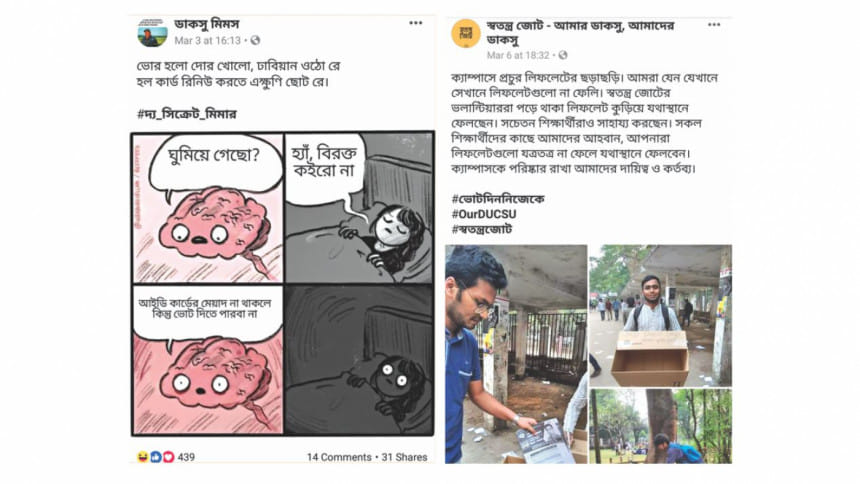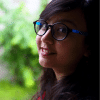The millennial way of campaigning

In almost three decades since the last Dhaka University Central Students' Union (Ducsu) election, a lot has changed. Social media is now an indispensable part of students' lives, with Facebook being a popular platform for sharing information. Campaigning is no longer limited to the streets, it is also done through carefully curated content online.
Shotontro Jote, an alliance of non-politically affiliated students, is very active on social media. “In any election, every candidate will have separate vote banks. We researched ours and realised that politically affiliated student organisations will obviously have a stronghold in dormitories, making it easier for them to influence resident students. These organisations are not planning to cater to about 35-40 percent non-resident students of Dhaka University (DU),” said Amit Pramanik, assistant general secretary aspirant from Shotontro Jote.
“There is definitely an information gap among non-residents. Having remained isolated from hall activities, they are not very politically aware. But their votes matter just as much,” he added, “Not everyone may live in halls, but everyone is on Facebook. Social media gives us a chance to take our cause to every individual.”
Both Shotontro Jote and Bangladesh Chhatra Union, a left-leaning student organisation, are pushing their campaign songs on social media. Every day, a few of their candidates go on Facebook Live to answer questions from general students. They have also been disseminating information on renewing hall ID cards and the voting process through social media.
Pramanik alleges that Bangladesh Chhatra League's (BCL) influence on campus makes it difficult for any other alliance to hold projection meetings, or campaign in dormitories. But internet is a level-playing field, he says. “We don't need a big budget to campaign online either.”
At the time of writing this report, BCL-majority panel “Sammilito Shikkharthi Sangsad” has only ten posts on their Facebook page. Their candidates have not gone on Facebook Live to interact with voters, nor have they made any posts explaining their manifesto. BCL leaders could not be reached for a comment on this matter.
Apart from using social media to ask for votes, there is another creative method through which people are spreading the news on Ducsu--memes. “This is not a campaign for any particular individual, rather an attempt to make people aware about the polls. Ours is strictly a meme page. We joke about the candidates, but at the same time we try to highlight the issues that plague DU,” said an admin of the popular meme page “Ducsu Memes”, seeking anonymity.
“Memes are perhaps millennials' favourite form of communication, and often their favourite art form. So if you want to get a message through to them, you must speak in a language they understand. The key is to be relatable,” he added.
Shadid Azam, a student of Institute of Business Administration, said “Campaign speeches are long and boring, but memes are easy and straightforward. It takes little effort to get information from memes, and it makes you curious about the election.”
Apart from pages, candidates are using groups to interact with voters. There are Facebook groups for separate halls, and some for all students. However, many students alleged that the most popular DU alumni group, called “Dhaka BishwabidyalayPoribar”, is heavily censoring posts that don't favour BCL. Hence non-BCL candidates have resorted to “Oporajeyo Dhaka Bishwabidyalay” to campaign.
The internet offers many possibilities, as is evident from Ducsu election campaigns. As more millennials become politically aware, the internet with its memes and pages becomes more useful and effective as a campaign tool.

 For all latest news, follow The Daily Star's Google News channel.
For all latest news, follow The Daily Star's Google News channel. 



Comments